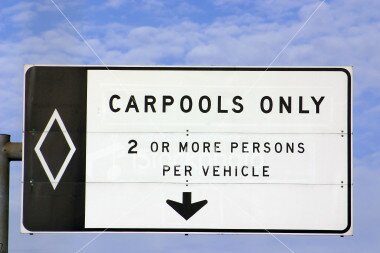Corporate Personhood: Can Corporations Ride Shotgun in the Carpool Lane?
January 7th, 2013A controversial 19th-century legal ruling created an obscure concept called “corporate personhood.” Essentially, courts consider corporations to be legal persons, thus affording them constitutional protections that would ordinarily be reserved for humans themselves. This became a hot-button issue during the 2012 election when Mitt Romney was quoted as saying “corporations are people, my friend” at a campaign stop.
There are strong arguments on both sides of the issue, as corporations are often the products of people and thus infringements on corporate activity may legitimately violate human rights, but the ambiguous categorization of them as “persons” often leads to odd legal issues. The most bizarre of all just happened and will soon result in a potentially significant court case. ABC News is reporting that a California man is claiming that he should not have to pay a fine for driving alone in the carpool lane, because he had corporate paperwork in the car with him as a passenger. Could this traffic court case upend corporate personhood?
The Complex Issues Around Corporate Personhood
Investors are afraid of being sued. Corporate personhood, as a legal construct, is mainly appreciated by the business community for its ability to simplify liability. By investing in a company, one’s personal assets are protected from seizure. Also, corporate personhood protects the right of individuals to use their corporations as they see fit.
However, it’s a clumsy way of accomplishing these legal goals, as individuals who engage in contracts with corporations are liable to a greater extent than the corporate persons with whom they are contractually bound. This means that real persons sometimes have fewer rights than corporate persons in a scenario when both are facing off in a lawsuit.
This Carpool Fine Case Exposes the Problem with Corporate Personhood
When California driver Jonathan Frieman chose to break the law and drive alone in the carpool lane with corporate paperwork in the passenger seat, he did so in an attempt to create a landmark case that might overturn corporate personhood. His activism is largely based in the thought that the legal term “person” is being used too ambiguously, and, in a sense, he is right. Where is the legal line between a human being and a corporation?
This discussion is simpler when corporations are a party in contract disputes, but far more complex when municipal codes or criminal laws are passed which are intended for humans and affect persons. In this case, the driving rule was designed to discourage solo drivers from using a lane designated for carpooling. Due to the ambiguous use of “persons” to describe the type of parties that must be in the vehicle in order for it to qualify as a carpool, it would seem that there would be a legal argument that a corporation satisfies that requirement.
Does having corporate paperwork in the car mean that a corporation is riding in the car? Will a judge risk overturning corporate personhood by issuing the fine in this case? It’s interesting to see. While it’s unlikely that this case will be the one that undoes a hundred-plus year-old legal principle, it definitely sets the stage for a new discussion on whether or not corporations should be considered persons.
Corporations, as products of people, should be allowed to act with freedom. Also, investors into corporations should not be the victims of frivolous lawsuits that target their personal wealth. However, there is probably a better way to achieve this than considering live humans and their corporate property to be identical concepts under the law.
Visit http://www.SilverCircleMovie.com to learn more about our upcoming 3D animated film. Also, the Silver Circle graphic novel is available now at the following hyperlinks in full color and black and white.


